Resume
Security Engineer Cover Letter Examples

May 29, 2025
|
12 min read
Unlock your dream security engineer job with a carefully crafted cover letter that leaves hackers quaking. Learn how to showcase your skills and experiences while keeping your future employer's interest locked down and secure.
4.70 Average rating
Rated by 348 people
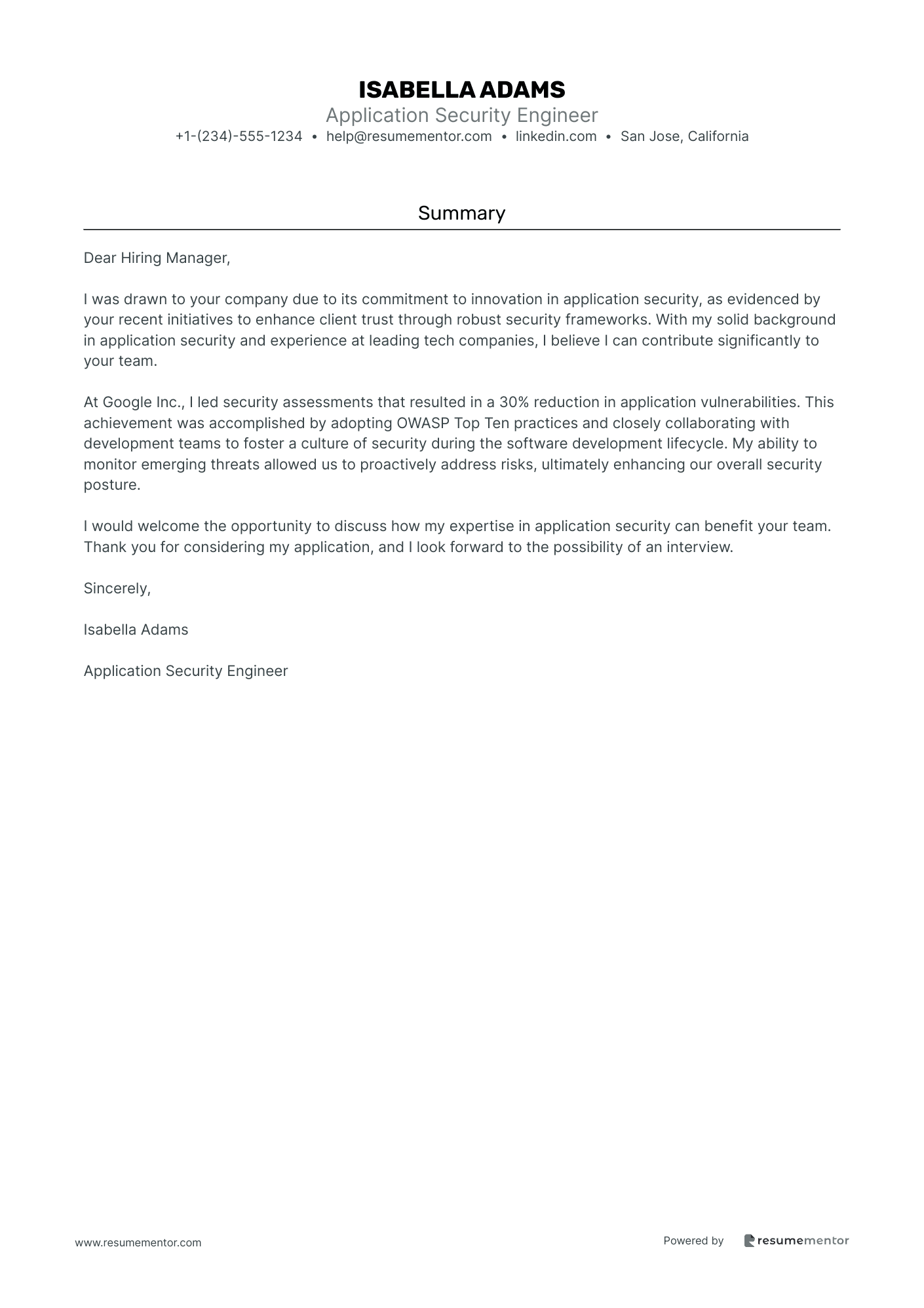
Application Security Engineer
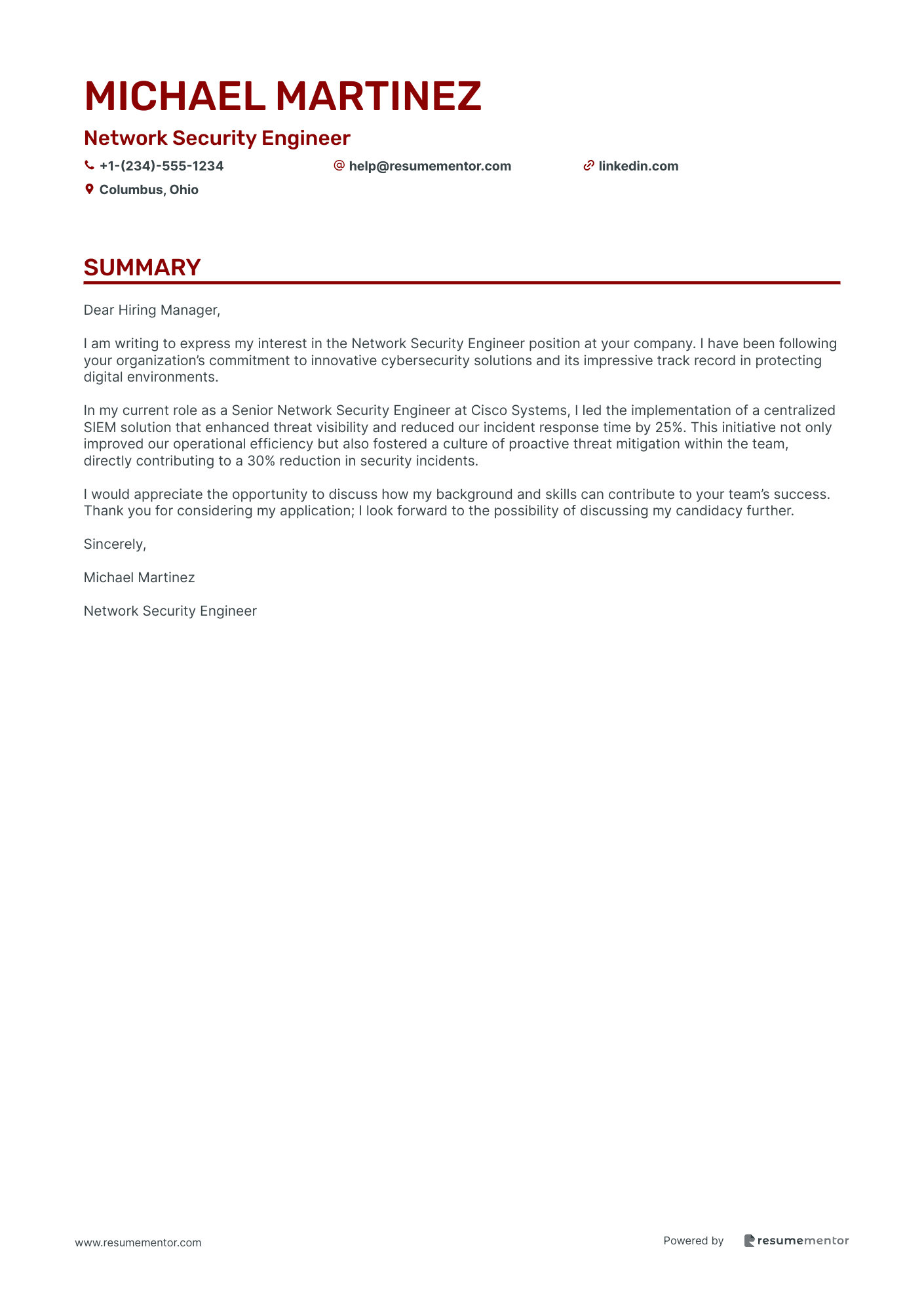
Network Security Engineer
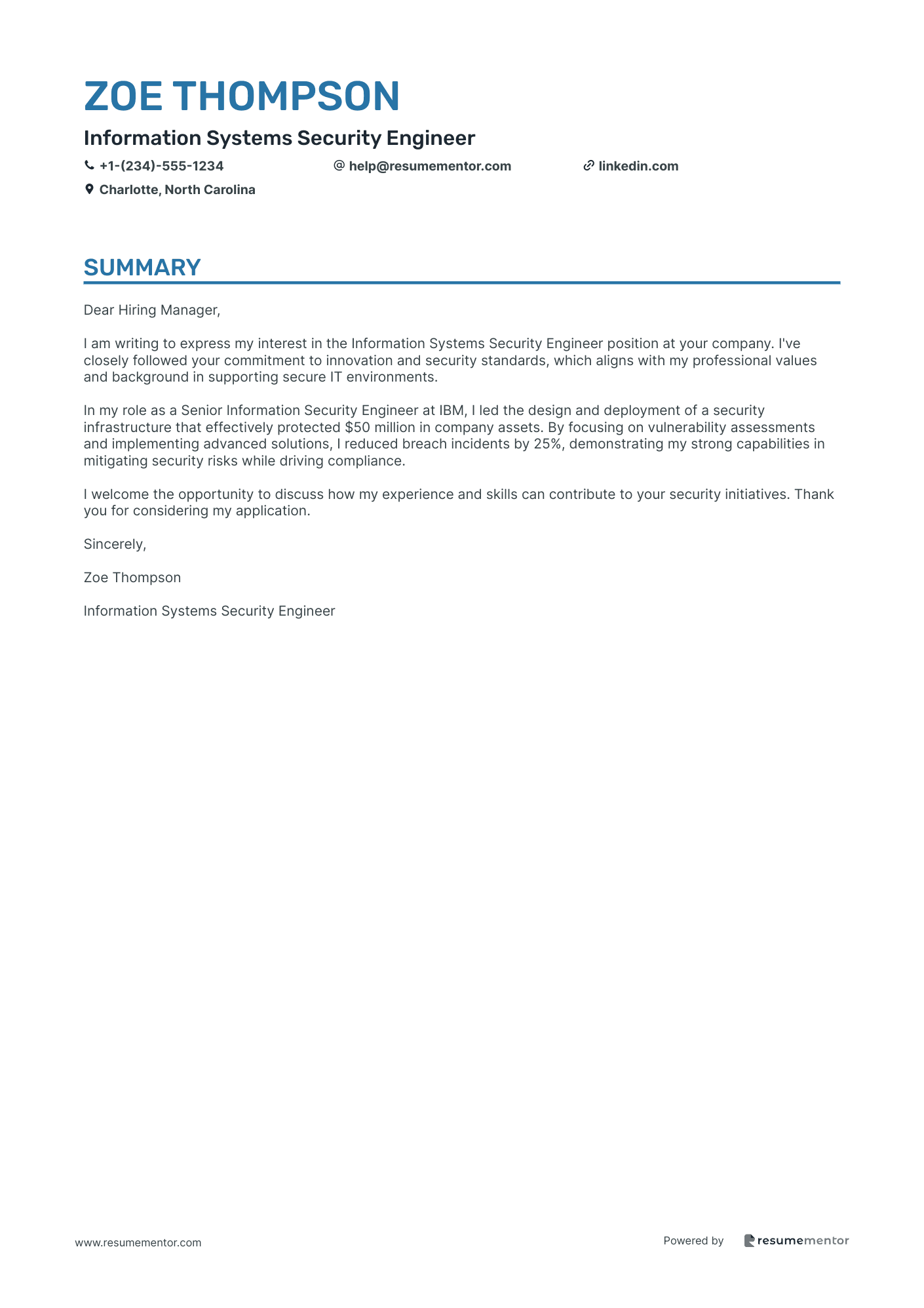
Information Systems Security Engineer
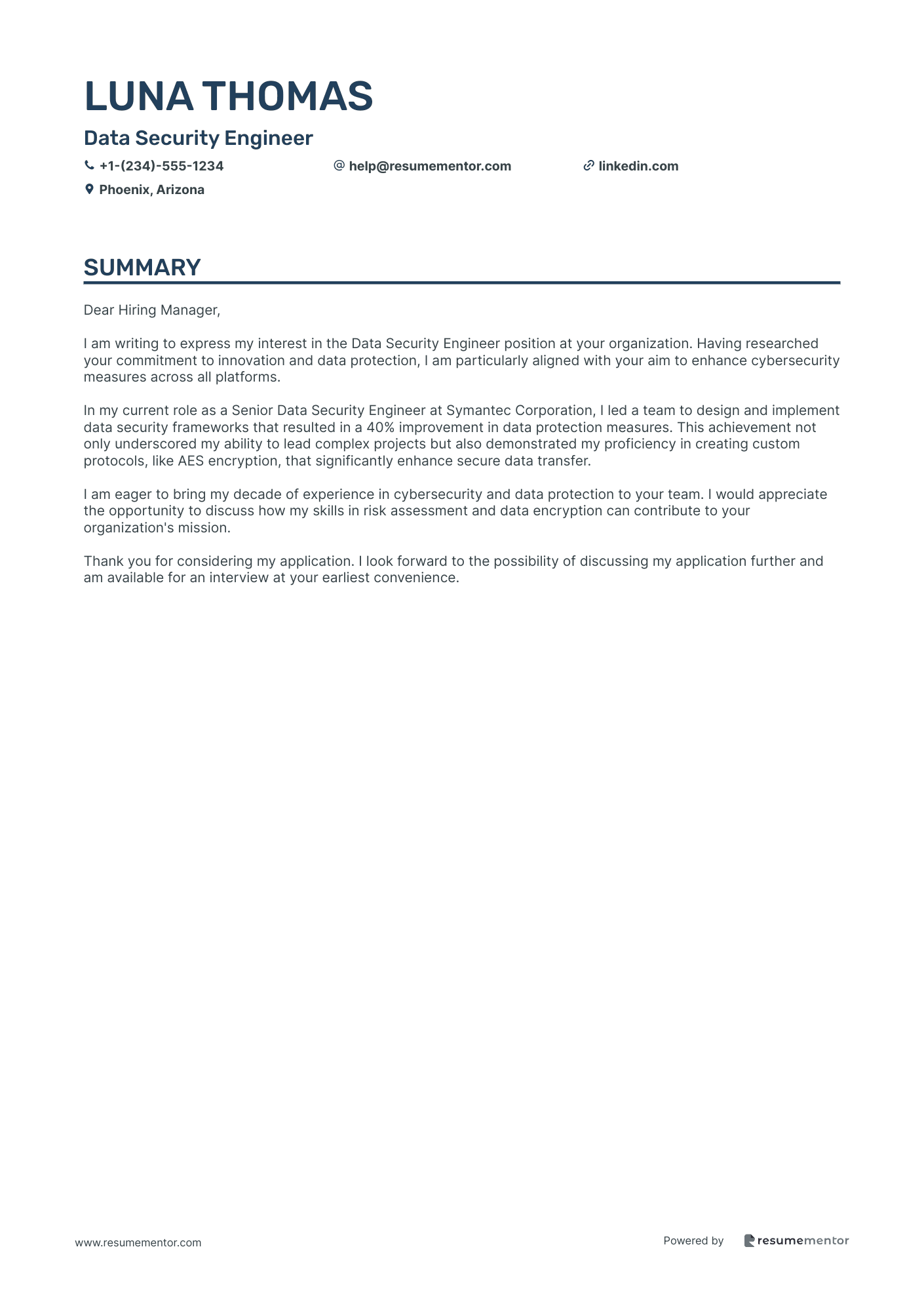
Data Security Engineer
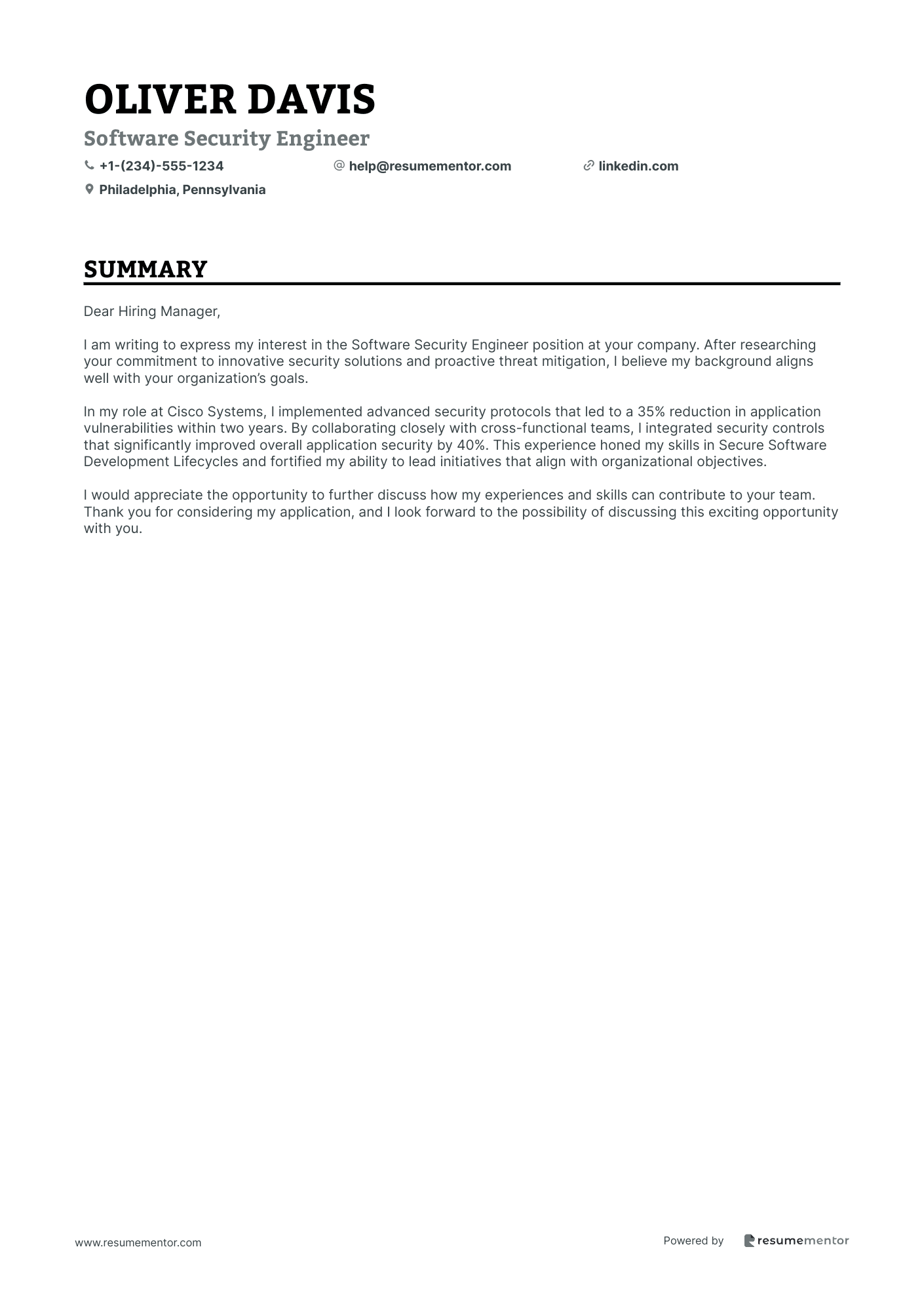
Software Security Engineer
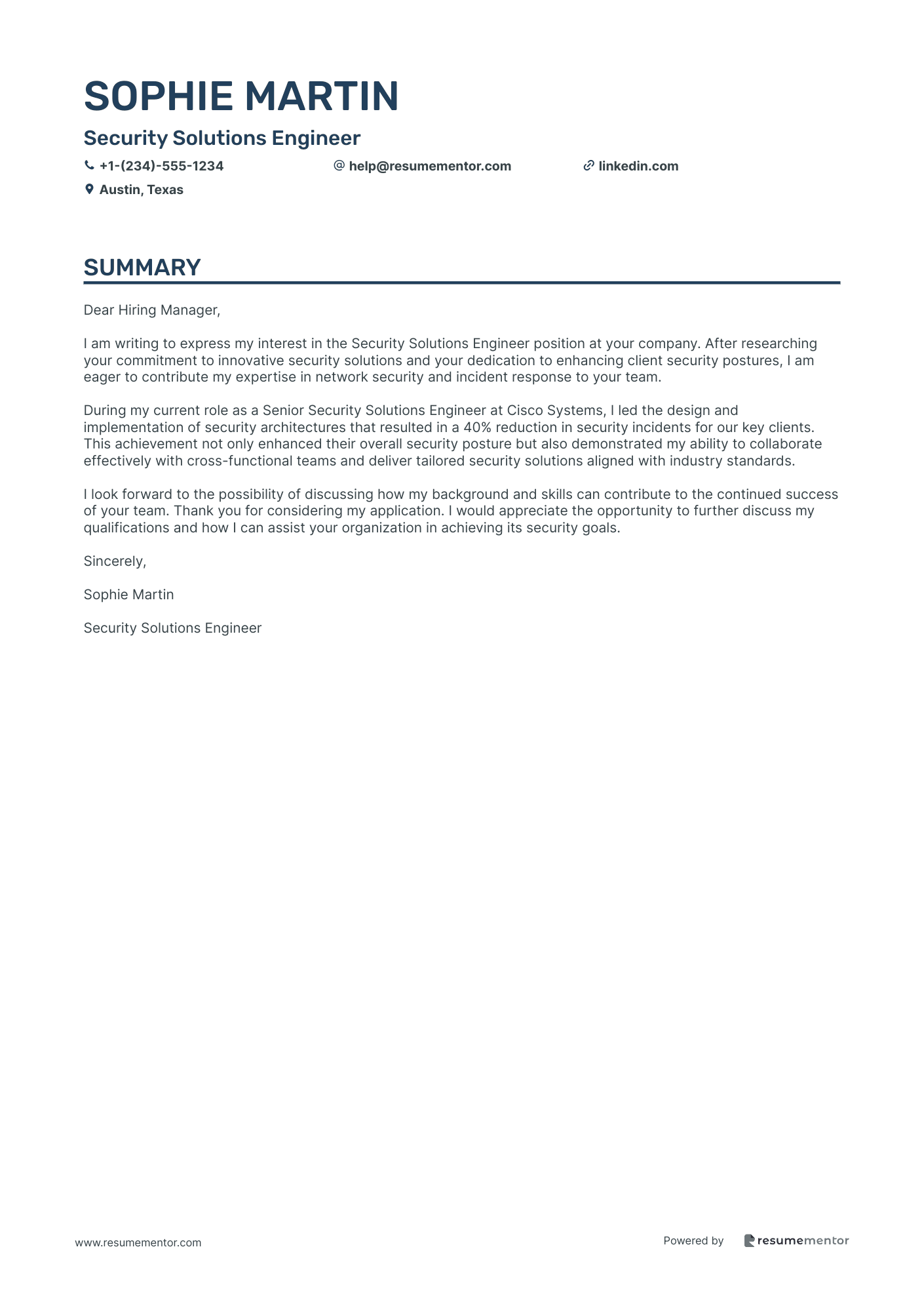
Security Solutions Engineer
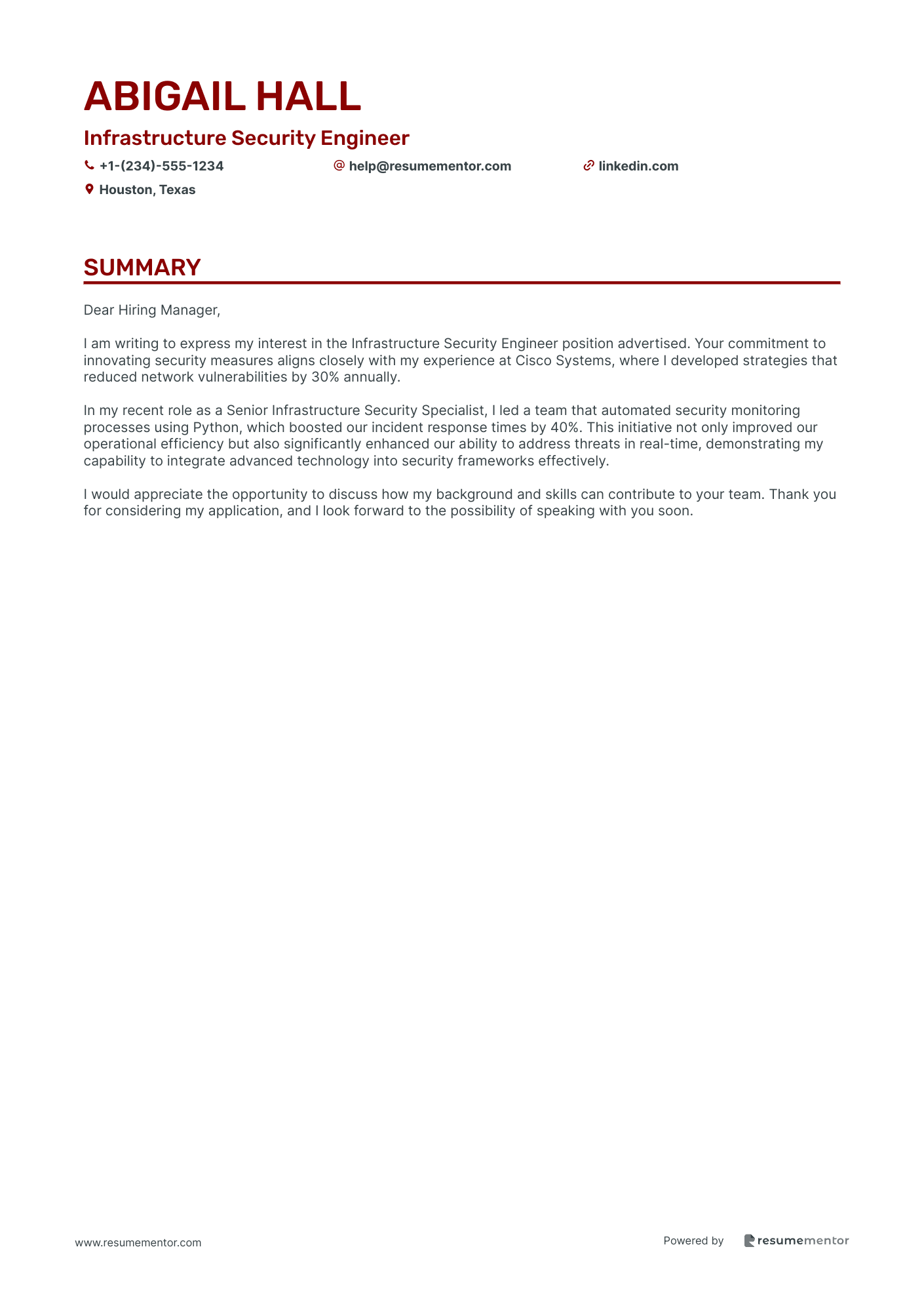
Infrastructure Security Engineer
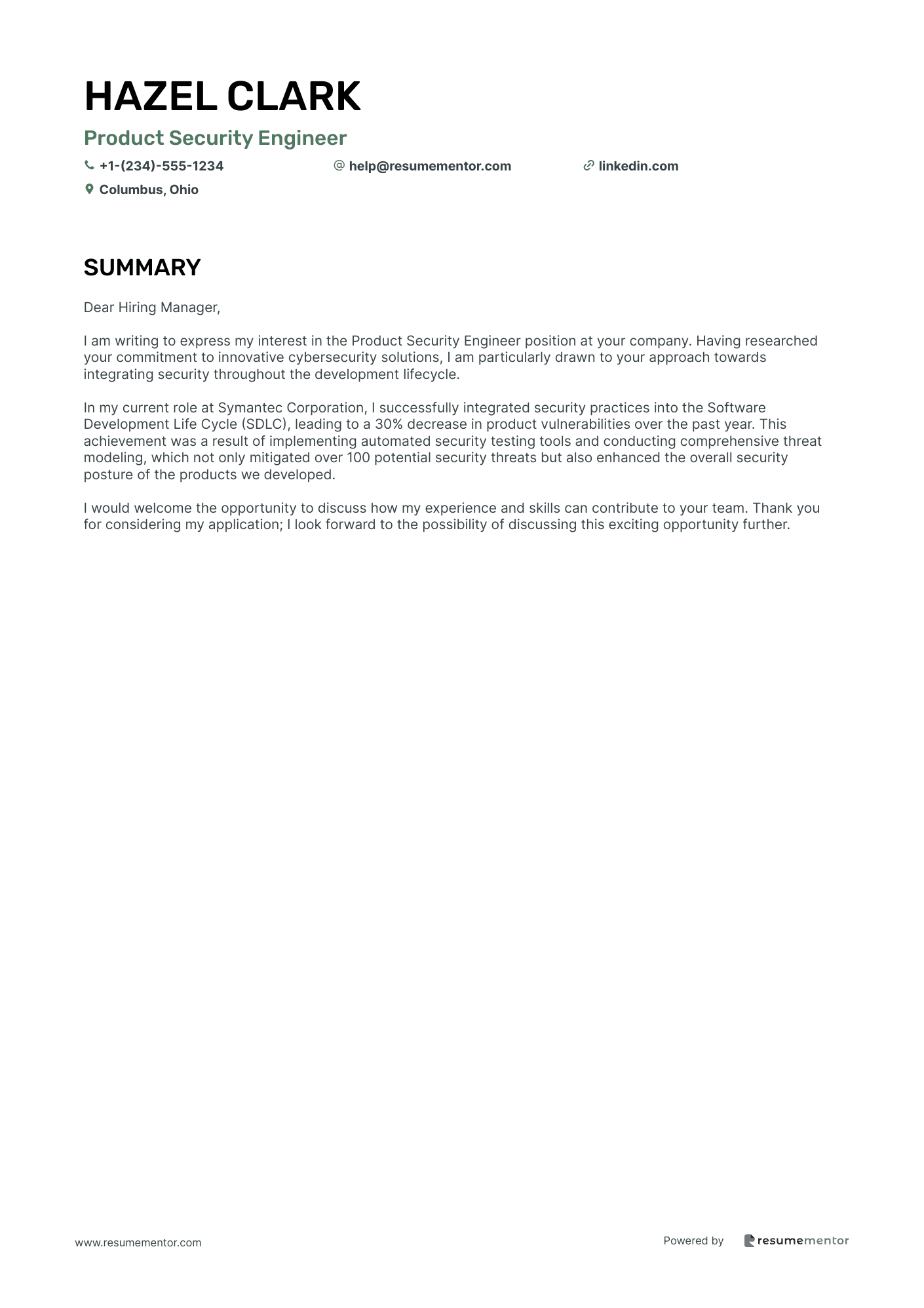
Product Security Engineer

Application Security Engineer cover letter sample
When applying for this role, focus on any prior experience with secure coding practices and threat modeling. Highlight your knowledge of common vulnerabilities, such as SQL injection or cross-site scripting, showcasing your understanding of OWASP Top Ten. Mention any relevant certifications, like Certified Information Systems Security Professional (CISSP) or Certified Secure Software Lifecycle Professional (CSSLP), to demonstrate your commitment to the field. Provide specific examples of how you've successfully identified and mitigated risks, following a ‘skill-action-result’ approach to illustrate your impact on past projects.
Isabella Adams
Application Security Engineer
Summary
Dear Hiring Manager,
I was drawn to your company due to its commitment to innovation in application security, as evidenced by your recent initiatives to enhance client trust through robust security frameworks. With my solid background in application security and experience at leading tech companies, I believe I can contribute significantly to your team.
At Google Inc., I led security assessments that resulted in a 30% reduction in application vulnerabilities. This achievement was accomplished by adopting OWASP Top Ten practices and closely collaborating with development teams to foster a culture of security during the software development lifecycle. My ability to monitor emerging threats allowed us to proactively address risks, ultimately enhancing our overall security posture.
I would welcome the opportunity to discuss how my expertise in application security can benefit your team. Thank you for considering my application, and I look forward to the possibility of an interview.
Sincerely,
Isabella Adams
Application Security Engineer
Network Security Engineer cover letter sample
When applying for this position, emphasize your proficiency in firewall management, intrusion detection systems, and VPN technologies. Showcase any certifications you hold, such as Certified Information Systems Security Professional (CISSP) or Cisco Certified Network Associate (CCNA). Highlight specific projects where your expertise prevented security breaches or improved network integrity. Use the 'skill-action-result' framework to reveal how your actions led to measurable improvements, such as reduced downtime or enhanced data protection, which ultimately strengthened overall organizational security.
Michael Martinez
Network Security Engineer
Summary
Dear Hiring Manager,
I am writing to express my interest in the Network Security Engineer position at your company. I have been following your organization’s commitment to innovative cybersecurity solutions and its impressive track record in protecting digital environments.
In my current role as a Senior Network Security Engineer at Cisco Systems, I led the implementation of a centralized SIEM solution that enhanced threat visibility and reduced our incident response time by 25%. This initiative not only improved our operational efficiency but also fostered a culture of proactive threat mitigation within the team, directly contributing to a 30% reduction in security incidents.
I would appreciate the opportunity to discuss how my background and skills can contribute to your team’s success. Thank you for considering my application; I look forward to the possibility of discussing my candidacy further.
Sincerely,
Michael Martinez
Network Security Engineer
Information Systems Security Engineer cover letter sample
When applying for this position, it's important to highlight your experience in cybersecurity and risk management. Showcase any relevant certifications like CISSP, CISM, or CompTIA Security+. Describe how you've implemented security protocols or conducted vulnerability assessments, detailing the outcomes. Emphasize your ability to work with various security technologies, such as firewalls or intrusion detection systems. Include specific examples of how your actions improved system security or reduced risks in previous roles. Demonstrating your problem-solving skills will also strengthen your application.
Zoe Thompson
Information Systems Security Engineer
Summary
Dear Hiring Manager,
I am writing to express my interest in the Information Systems Security Engineer position at your company. I've closely followed your commitment to innovation and security standards, which aligns with my professional values and background in supporting secure IT environments.
In my role as a Senior Information Security Engineer at IBM, I led the design and deployment of a security infrastructure that effectively protected $50 million in company assets. By focusing on vulnerability assessments and implementing advanced solutions, I reduced breach incidents by 25%, demonstrating my strong capabilities in mitigating security risks while driving compliance.
I welcome the opportunity to discuss how my experience and skills can contribute to your security initiatives. Thank you for considering my application.
Sincerely,
Zoe Thompson
Information Systems Security Engineer
Data Security Engineer cover letter sample
When applying, it's important to showcase your experience with security protocols and risk management. Highlight any familiarity with relevant frameworks such as NIST or ISO standards. Mention certifications like CISSP or CEH to validate your expertise. Additionally, provide examples where you've implemented security measures that reduced vulnerabilities or improved data protection. Use specific metrics or statistics to demonstrate the impact of your efforts. If you've worked on incident response plans or security audits, include those experiences to strengthen your application.
Summary
Dear Hiring Manager,
I am writing to express my interest in the Data Security Engineer position at your organization. Having researched your commitment to innovation and data protection, I am particularly aligned with your aim to enhance cybersecurity measures across all platforms.
In my current role as a Senior Data Security Engineer at Symantec Corporation, I led a team to design and implement data security frameworks that resulted in a 40% improvement in data protection measures. This achievement not only underscored my ability to lead complex projects but also demonstrated my proficiency in creating custom protocols, like AES encryption, that significantly enhance secure data transfer.
I am eager to bring my decade of experience in cybersecurity and data protection to your team. I would appreciate the opportunity to discuss how my skills in risk assessment and data encryption can contribute to your organization's mission.
Thank you for considering my application. I look forward to the possibility of discussing my application further and am available for an interview at your earliest convenience.
Software Security Engineer cover letter sample
Emphasize your experience with secure coding practices, penetration testing, and vulnerability assessments. Highlight any familiarity with security frameworks like OWASP or NIST. If you have certifications such as CISSP or CEH, be sure to mention them along with the testing duration. Provide concrete examples of how you've identified and mitigated security threats in previous roles. Utilize the 'skill-action-result' format to showcase your impact, such as reducing security incidents or improving compliance rates, to make your application stand out.
Oliver Davis
Software Security Engineer
Summary
Dear Hiring Manager,
I am writing to express my interest in the Software Security Engineer position at your company. After researching your commitment to innovative security solutions and proactive threat mitigation, I believe my background aligns well with your organization’s goals.
In my role at Cisco Systems, I implemented advanced security protocols that led to a 35% reduction in application vulnerabilities within two years. By collaborating closely with cross-functional teams, I integrated security controls that significantly improved overall application security by 40%. This experience honed my skills in Secure Software Development Lifecycles and fortified my ability to lead initiatives that align with organizational objectives.
I would appreciate the opportunity to further discuss how my experiences and skills can contribute to your team. Thank you for considering my application, and I look forward to the possibility of discussing this exciting opportunity with you.
Security Solutions Engineer cover letter sample
When applying for this role, it's important to emphasize any previous experience in cybersecurity or network security. Highlight your technical skills such as proficiency in firewalls, intrusion detection systems, and security protocols. Certifications like CISSP or CEH can strengthen your application, so be sure to include them. Use specific examples of how you've identified vulnerabilities and implemented solutions, showcasing your problem-solving abilities. Follow a 'skill-action-result' structure to demonstrate the positive impact your contributions have had on security measures in past roles.
Sophie Martin
Security Solutions Engineer
Summary
Dear Hiring Manager,
I am writing to express my interest in the Security Solutions Engineer position at your company. After researching your commitment to innovative security solutions and your dedication to enhancing client security postures, I am eager to contribute my expertise in network security and incident response to your team.
During my current role as a Senior Security Solutions Engineer at Cisco Systems, I led the design and implementation of security architectures that resulted in a 40% reduction in security incidents for our key clients. This achievement not only enhanced their overall security posture but also demonstrated my ability to collaborate effectively with cross-functional teams and deliver tailored security solutions aligned with industry standards.
I look forward to the possibility of discussing how my background and skills can contribute to the continued success of your team. Thank you for considering my application. I would appreciate the opportunity to further discuss my qualifications and how I can assist your organization in achieving its security goals.
Sincerely,
Sophie Martin
Security Solutions Engineer
Infrastructure Security Engineer cover letter sample
When crafting your cover letter, emphasize any relevant experience with firewalls, intrusion detection systems, and security protocols. Highlight your ability to assess vulnerabilities through penetration testing or security audits. Certifications like CISSP or CEH can add credibility, so be sure to mention them, along with any hands-on projects. Use specific examples to illustrate how you successfully mitigated security risks in previous roles. Follow a results-oriented approach by demonstrating how your contributions enhanced the company's security posture or compliance efforts.
Abigail Hall
Infrastructure Security Engineer
Summary
Dear Hiring Manager,
I am writing to express my interest in the Infrastructure Security Engineer position advertised. Your commitment to innovating security measures aligns closely with my experience at Cisco Systems, where I developed strategies that reduced network vulnerabilities by 30% annually.
In my recent role as a Senior Infrastructure Security Specialist, I led a team that automated security monitoring processes using Python, which boosted our incident response times by 40%. This initiative not only improved our operational efficiency but also significantly enhanced our ability to address threats in real-time, demonstrating my capability to integrate advanced technology into security frameworks effectively.
I would appreciate the opportunity to discuss how my background and skills can contribute to your team. Thank you for considering my application, and I look forward to the possibility of speaking with you soon.
Product Security Engineer cover letter sample
When applying for this role, it's essential to stress any experience with security protocols, vulnerability assessments, and risk management. Highlight your familiarity with common security frameworks like NIST or ISO, as well as any certifications such as Certified Information Systems Security Professional (CISSP) or Certified Ethical Hacker (CEH). Provide specific examples of how you've identified and mitigated security risks, focusing on the 'skill-action-result' format to demonstrate your impact. Emphasize teamwork and collaboration with cross-functional teams to reinforce your adaptability and problem-solving skills.
Hazel Clark
Product Security Engineer
Summary
Dear Hiring Manager,
I am writing to express my interest in the Product Security Engineer position at your company. Having researched your commitment to innovative cybersecurity solutions, I am particularly drawn to your approach towards integrating security throughout the development lifecycle.
In my current role at Symantec Corporation, I successfully integrated security practices into the Software Development Life Cycle (SDLC), leading to a 30% decrease in product vulnerabilities over the past year. This achievement was a result of implementing automated security testing tools and conducting comprehensive threat modeling, which not only mitigated over 100 potential security threats but also enhanced the overall security posture of the products we developed.
I would welcome the opportunity to discuss how my experience and skills can contribute to your team. Thank you for considering my application; I look forward to the possibility of discussing this exciting opportunity further.
Related Articles

Continue Reading
Check more recommended readings to get the job of your dreams.
Resume
Resources
Tools
© 2026. All rights reserved.
Made with love by people who care.
